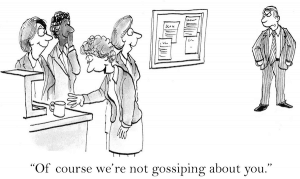Tina Hallis's Blog, page 26
August 19, 2018
If you don’t have anything good to say – Spontaneous Trait Transference

When you’re talking about other people, do you tend to expound on their good traits, or do you find yourself venting about the things that bug you?
“You can tell more about a person by what they say about others than you can by what others say about them.” Audrey Hepburn
I wish I was able to say that I always focus on the good stuff, but I have a long way to go. Yet, I also realize that our brains are wired to focus on the negative, even when it comes to other people. So I do give myself permission to be human.
But I recently heard some news that makes me want to try even harder. I learned about Spontaneous Trait Transference — a term for a fascinating area of research on how the words we use to describe others are spontaneously associated back to us, the storyteller.
If you commonly talk about other people using words like generous, friendly, amazing, smart, or helpful, people remember you using these words and will associate them with you, not just the person you were describing. Wow!
But what about those times you complain about someone? If you use words like controlling, self-centered, or stuck-up, you might think that others would never think of you as having these negative characteristics. Interestingly, Skowronski et al. found that spontaneous trait transference is not based on logic, but is a mindless association.
Pay attention this week. Catch yourself if you start talking about someone’s bad traits. See if you can spend more time commenting on people’s good characteristics. It will be a positive reflection on you!
August 12, 2018
Why It’s OK to Blame, Judge, & Envy Others – Name It to Tame It
What’s my instant reaction when I can’t find my car keys? — Who took my keys?!
Now I actually laugh at this voice in my head because, of course, I know that no one took them. I just misplaced them. But my instincts quickly kick in, wanting to blame someone. Have you ever had an immediate reaction to accuse someone of doing something and in the next instant realized there was no one to blame but yourself?
How about feeling envious? Maybe your friend just bought a new phone— the one you’ve been wanting. You want to feel happy for them, but you also notice some envy creeping in. I want their phone!
And then there’s judging. How often do we make instant judgments about people based on their clothes, car, the way they look or walk. That person looks weird, lazy, stuck-up, or whatever impression we have.
It wasn’t until recently that I’ve learned that these are all normal reactions. Some of us have them more than others, but they are part of how we’re wired, our instincts, and our training. If we pretend we don’t feel these emotions because we think it makes us a bad person, then we actually lose some of our control over them. We may still unconsciously do or say something because of how we’re feeling.
But if we acknowledge envy, judgment, blame, etc. and name our emotions, they lose their power more quickly. “Name it to tame it” is a tool that can help us get information from our emotions instead of letting them control us. This term was first coined by author and psychiatrist Dr. Daniel Siegel.
When we use words to describe our emotions, it helps activate the reasoning part of our brain and calms down our emotional limbic brain. Now we have the opportunity to choose – is it a good idea to voice or act on our envy, blame, or judgment? Is there information in this reaction or should we shift away from this thought?
Some approaches that have worked for me include thinking,
How funny that my reaction is to blame someone for this, or
There goes my brain again, judging others, or
How interesting that I’m feeling envious.
Give it a try! See if you can catch yourself feeling envy, judgment, blame or another negative emotion towards someone. Try the “Name it to tame it” approach and see how it works for you.
August 5, 2018
I Had Every Right to Be Mad! But It Wasn’t Going to Make Things Better

I finally had an opportunity to use the gift card I’d been given a few weeks ago for a volunteer project. It was for a store I never go to, but I was willing to make a special trip. My daughter and I explored the store and finally found a couple of items we liked that added up to just over the $50 on the card.
At the self-checkout, we couldn’t get the gift card to work. We waited for help, but the clerk didn’t have any luck, no matter what she tried. So she sent us up to the customer service counter.
After more waiting, the assistant at the counter had similar bad luck. He kindly used his cell phone to call the number on the card. It took him many tries before he was finally able to connect with a real person. He handed his phone to me so I could answer the questions directly.
“Where did you buy this card?” the voice asked. I told them I had received it as a gift. They said that it had not been activated when it was purchased so they would need the receipt as proof. I would also need to mail in a copy of the card and my identification. After receiving all the necessary information, it would take only three days to process it.
I had already been getting impatient with the hassle and the waiting so far. AND it looked like we weren’t going to be able to use the gift card that day. So much for helpful customer service and me ever visiting this store again, I thought. We told the clerk we didn’t want our items after all and left the store.
I was mad! I couldn’t believe they wouldn’t find a way to honor the card! I was noticing my strong reaction. It was so unfair! We had wasted so much time! I told my daughter that I didn’t like how I was feeling, and I wanted to find something to learn from this frustrating situation.
Then it hit me . . .
Most people would say that I had every right to be mad. And because it felt unfair, my natural instinct was to get upset. But my negative emotions weren’t going to change what happened. The only person who was suffering was me. It really wasn’t a big deal so why should I waste energy on it?
After having this conversation with my daughter (and several times with myself), I took a few deep breaths and decided I was done. I wasn’t going to dwell on it and let it affect the rest of my day.
Have you ever had “every right to be mad” but knew that feeling this way wouldn’t make things better? Next time, try to stop your suffering sooner by recognizing that you’re wasting your time and energy. You don’t have to stay mad. Have that conversation with yourself and take several deep breaths.
July 29, 2018
Beware When You Compare – The Pitfalls of “Social Comparison”

I’m grateful to have so much abundance and goodness in my life. When I think about all that I have with my family, home, career, health, etc., I feel great joy and peace.
Unless I look at my husband’s pickup. It’s getting rusty. Not just a few small spots, but several areas. And they’re growing. It still drives and runs good, but it’s starting to look a little rough at 18 years old. I see so many nice pickups on the road and in parking lots. As I compare them to what we have, these shiny, nicer vehicles make me feel envious. Maybe my life isn’t so good after all?
“Social Comparison” is a term used in psychology to describe our tendency to compare areas of our life (money, looks, belongings, resources, abilities, etc.) to others. We then make judgments about the quality of our life based on what we notice. We now have more opportunities than ever for “social comparison” with the influx of social media, reality TV, and other digital channels.
What’s the impact? If we “compare up” to others that seem to have more than us, we may feel dissatisfied with our life. If we “compare down” to people that seem worse off, it may make us feel better. There is also the risk of feeling superior or smug depending on who the other person is.
What can we do? Here are some suggestions. First, be aware of this phenomenon. Some people have a tendency to do social comparison more than others. If you catch yourself feeling bad because you’re “comparing up,” shift your thoughts to all that you do have. Remind yourself to be happy for the situation of others who appear to be better off than you. Realize that nobody’s life is perfect, and you may not know what troubles they have behind the scenes. The grass may not actually be “greener” on the other side.
If you find yourself “comparing down,” remind yourself to feel compassion but not pity or smugness. Use it as a way to appreciate all the good in your life. Consider ways you might be able to help.
A more helpful comparison is when we consider our current personal growth and improved wisdom to where we were, and use it to motivate us to where we want to be.
July 23, 2018
The Power of Questions: How Curiosity Can Foster Connection and Understanding

I’m excited to share a guest blog from a positivity expert I recently discovered, Robyn Stratton-Berkessel. When I saw this post from her on the power of being curious about others and how it can foster connection, I asked her permission to share it with all of you. Now more than ever, our families, communities, and the world need greater understanding and connection. Enjoy!
How curious are you about others and the world? What information and stories might you seek? Inquiry starts movements. Inquiry questions keep us open to possibilities and enable us to engage in further dialogue. Inquiry helps us to discover the stories of others in potentially heartfelt ways. Inquiry stimulates curiosity.
In his 2017 book, The Curiosity Gene, On the Origin of Humankind by Means of Intrinsic Motivation, science writer Alexandros Kourt posits that inquisitiveness is responsible not only for human survival but also for our evolution into the most intelligent creature on earth. He believes curiosity holds the key to happiness and personal fulfillment.
Writer Elizabeth Gilbert, author of seven books, including Eat Pray Love, her most well-known book, and Big Magic, her most recent, brings the idea even closer:
“I want to live in a society filled with people who are curious and concerned about each other rather than afraid of each other. So taking this virtue of investigation, that gentle friend of curiosity, as something that we can live by would be good for us collectively.”
When we invite inquiry, and consciously construct inquiry questions it enables us to connect with others and to collect stories, information, intelligence, and even good will, something never to be underestimated.
Inquiry is such a pivotal life literacy that we remember those people who are good at asking questions. They show interest in us and ask us thought-provoking, story making questions that move conversations past pleasantries.
We remember high school teachers, bosses and friends whose generative questions were life-giving and life-changing for us—they helped us develop insights into something important for us.
Neuroscience tells us we need to discover our own insights. We learn better, not when someone tells us something, but when conversation or reflection shows us something so that we see newly and make choices based on our new perceptions. People support what they themselves create.
Try this:
Start meetings and family meals with a generative question, like Robyn’s question to cab drivers: What’s the best thing that happened….? To see this in action, watch Robyns’ TEDX talk, Playful Inquiry.
When problems are framed in a deficit way, invite inquiry about how the situation can be reframed toward solutions (the literacy in our next episode.)
Before you answer a question or start giving your opinion about something, consider asking a new question to help the questioner think more deeply.
This is an abbreviated version of the complete post and podcast, Inviting Inquiry Questions: A Core Choice for Appreciative Voice
Robyn Stratton-Berkessel is a positivity strategist and Appreciative Inquiry Practitioner. who enables people, whoever they are, to elevate and amplify their own positivity and the collective capacity in their organizations and communities, so that everyone feels empowered as co-creators of their own futures. Learn more at http://positivitystrategist.com
July 15, 2018
Thank Goodness Things Didn’t Go the Way I Wanted – Accepting the Way Things Turn Out

We had rented a cabin on a lake for our vacation, but when we got there, we found out that the shoreline by us was full of weeds and stumps. No swimming or fishing from shore here!
So we decided to rent a pontoon. The next day was so supposed to be warm and sunny – a perfect day to cruise the lake and jump off the boat.
We called every resort and rental place within 30 miles. Nothing was available!! I was frustrated! We wanted to enjoy some time on the water but it seemed like it wasn’t going to happen. Thank goodness it didn’t . . .
Even though the weather channel predicted a beautiful day, the next day turned out to be stormy with rain. Yikes! I was thankful we weren’t out on the lake and hadn’t spent the money to rent a pontoon. Instead, it turned into a day to play games and watch a movie inside.
It’s natural to feel upset when things don’t go the way we want. But sometimes we find out later that it was a good thing, like with our boat rental. What if a situation didn’t work out the way we wanted, but we never knew it was for the better?
What if it we avoided an accident because we forgot our phone and had to turn around?
What if it we ended up with a better job because we didn’t get hired for the one we thought we wanted?
What if we told ourselves a different story and accepted the way things turned out? When I put this into practice, I find my negative feelings quickly subside, and I don’t dwell on my frustration. I may never know for sure if things happened for the better, but if I can at least consider the possibility, it totally changes my mood. Give it a try!
July 8, 2018
Shouldn’t packing for vacation be fun? Our focus impacts our emotions

A couple of months ago, I was packing to go on vacation. I was getting stressed because I couldn’t find my new swimsuit. I loved that suit! As I was tearing through my drawers and closet, it hit me – I had forgotten some clothes in a dresser at a hotel I had stayed at last fall. Darn! I had left it there!
Now I was going to have to quickly go shopping for another suit. I was feeling frustrated because I was in a rush, swimsuits aren’t cheap, and I knew I wouldn’t find another I liked as much as the one I had lost.
Not only that, I remembered that when I called the hotel last fall to ask them about my forgotten clothes, they couldn’t find them. The cleaning people must have removed them. Ugh!
I could feel my mood going downhill fast! But I didn’t want to let a little thing like a swimsuit dampen my enthusiasm for having a fun vacation. I had a choice!
I decided to shift my thinking. I was grateful that I did have some time to shop for a new suit. I had a coupon that would bring down the price. I was happy to have the opportunity to get away. I hoped that someone else was enjoying my lost suit and liked it as much as I had.
There! I felt much better!
Isn’t it amazing how our emotions are impacted by what we focus on? Sometimes we need reminders that we have that choice. Sometimes it’s harder than others. But in every situation, we do get to choose. This week, look for opportunities to shift your thinking and choose to focus on the bright side. See how you feel.
June 24, 2018
The Positivity Tip No One Wants to Hear – Ego Disruptors

I’ve been rereading the notes I made in Cy Wakeman’s book, No Ego: How Leaders Can Cut the Cost of Workplace Drama, End Entitlement, and Drive Big Results. There’s so much good stuff but a couple of my highlights caught my attention yesterday and made me pause.
Warning! Before you read them, be aware that her book focuses on how to eliminate ego-drive drama in the workplace, and the following excerpts are about how to “disrupt the ego.” These are great suggestions for our home life, too!
“When you start judging others or feeling resentment about what you perceive you’re not getting, turn that energy back toward your own evolution.”
“When you get stuck in judgment with thoughts like “They shouldn’t act that way. . . “ you’ve created an attitude of I am right, and you are wrong. I am good, and you are bad. Work on your flexibility by opening your mind.”
“Do you have advice for others? Write down exactly what you think they should or should not be doing, and enact that advice in your own life.”
When I make a point of observing my initial reaction to situations, I become embarrassingly aware of how often my ego kicks in. It’s much easier to see how other people should improve than it is to reflect on my own behavior. But then I remind myself that this is normal and is often part of our survival instinct. However, just because it’s normal doesn’t mean I have to stay in that judgment or thought, and I don’t have to act on it. Our egos may be a reason for drama but they should not be an excuse. We have the power to choose.
Pick one of Cy’s ego disrupters from above to experiment and practice this week. See if you can start tuning into your ego’s voice.
June 17, 2018
Get Better at Noticing Your Thoughts – Practice “Buffering”

In my Path for PositivityTM, one of the critical steps is “Noticing Our Thoughts.” If we are going to practice the power of choosing what we focus on and think about, we have to start by tuning in to our thoughts in the moment. How can we get better at doing this?
Our family was recently watching the Stranger Things Netflix series. We struggle with streaming video because of our very poor WiFi bandwidth so it’s not surprising that during one of the suspenseful scenes, the program “paused” to buffer. During this break, I was able to step back and notice how I was feeling physically (heart racing, tense muscles) and emotionally (worried, curious, excited).
This approach is a great way to practice paying attention to our thoughts. We need to “Buffer!” Here are some ideas for situations where you can give it a try.
Before a family gathering or any kind of social event, set your phone or watch to buzz a couple of different times during the festivities. Use the reminder as an opportunity to pause, step back, and buffer.
Go on social media and look for a couple of postings where you disagree with the person’s comments or a posting that brings up strong emotions. These are great opportunities to buffer!
Think back to a situation that made you feel stressed, frustrated, or discouraged. Relive as much detail as possible so you feel the same emotions. Pause and notice your physical and emotional reactions.
If we practice noticing our thoughts, it becomes easier and we start to tune in more often. This is a key step before we can choose to shift our thinking and take back control over our naturally negative survival instincts.
Make a plan right now. Think of one or two ways you can practice “buffering” this week.
June 9, 2018
Do You Rise & Shine? Setting Your Morning Intention for a Brighter Day

This is one of my favorite positivity tips from my new book, Sharpen Your Positive Edge: Shifting Your Thoughts for More Positivity & Success. Now that school is out and mornings are less hectic, it’s a little easier for me to take a few extra minutes to savor the upcoming day and immerse myself in gratitude before getting out of bed.
When you first wake up in the morning, and you’re just remembering where you are and what day and time it is, what crosses your mind? Do you think about how tired you are or how you wish you could sleep more? Maybe your mind jumps to those things you’re not looking forward to in your day—that stressful meeting, the bad weather, the irritating co-worker . . . If you’re like most people, the strong negative bias of your brain can easily start you off with a less-than-positive outlook that sets the tone for your day. Thankfully, we have other options.
Try a Morning Intention
Here are a few suggestions to try. Set your alarm to go off five minutes before you need to get up. Spend that time thinking about things you’re looking forward to or things you appreciate.
If it’s hard to come up with ideas first thing in the morning, make a list the night before and put it next to your bed so you can read it when you wake up. If that doesn’t work, read over your list during breakfast or post a few notes on your bathroom mirror. The goal is to set a positive tone for our day with intention instead of letting our brains default to their usual negative focus.
I love my sleep. It seems like I’m always feeling warm and comfortable when the alarm goes off. It can be so hard to get out of bed in the cold and dark. When I remind myself of something I want to get done, something I’m looking forward to, or some of the things I’m thankful for, I find it energizes me and gets me moving with an upbeat attitude. Give it a try and see if you notice a difference.
Reflect on what you could think about before you get out of bed tomorrow morning. Keep the list by your bed and read it first thing when you wake up.



